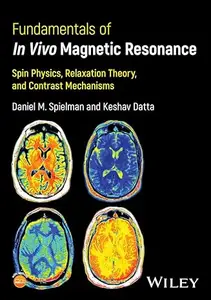Fundamentals of In Vivo Magnetic Resonance Spin Physics, Relaxation Theory, and Contrast Mechanisms

Free Download Fundamentals of In Vivo Magnetic Resonance
by Daniel M Spielman
English | 2024 | ISBN: 1394233094 | 291 pages | True PDF | 27.86 MB
Authoritative reference explaining why and how the most important, radiation-free technique for elucidating tissue properties in the body works
In Vivo Magnetic Resonance helps readers develop an understanding of the fundamental physical processes that take place inside the body that can be probed by magnetic resonance imaging (MRI) and magnetic resonance spectroscopy (MRS), uniquely bridging the gap between the physics of magnetic resonance (MR) image formation and the in vivo processes that influence the detected signals, thereby equipping the reader with the mathematical tools essential to study the spin interactions leading to various contrast mechanisms.
With a focus on clinical relevance, this book equips readers with practical knowledge that can be directly applied in medical settings, enabling informed decision-making and advancements in the field of medical imaging. The material arises from the lecture notes for a Stanford University Department of Radiology course taught for over 15 years.
Aided by clever illustrations, the book takes a step-by-step approach to explain complex concepts in a comprehensible manner. Readers can test their understanding by working on approximately 60 sample problems.
Written by two highly qualified authors with significant experience in the field, In Vivo Magnetic Resonance includes information on:
The fundamental imaging equations of MRI
Quantum elements of magnetic resonance, including linear vector spaces, Dirac notation, Hilbert Space, Liouville Space, and associated mathematical concepts
Nuclear spins, covering external and internal interactions, chemical shifts, dipolar coupling, J-coupling, the spin density operator, and the product operator formalism
In vivo MR spectroscopy methods
MR relaxation theory and the underlying sources of image contrast accessible via modern clinical MR imaging techniques
With comprehensive yet accessible coverage of the subject and a wealth of learning resources included throughout, In Vivo Magnetic Resonance is an ideal text for graduate students in the fields of physics, biophysics, biomedical physics, and materials science, along with lecturers seeking classroom aids.

